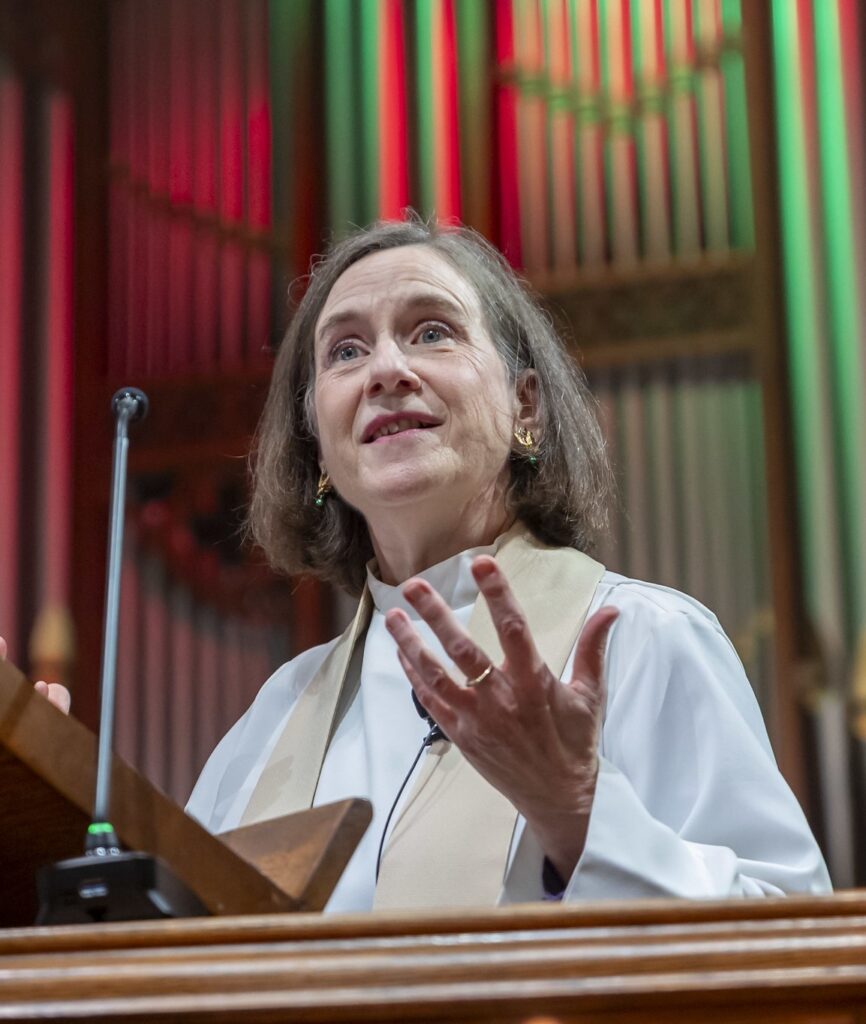
Christmas Eve, December 24, 2024, Penelope Bridges
Alleluia, unto us a child is born. Come, let us adore him. Alleluia.
If ever there was a night made for poetry and song, tonight is the night. We revel in the familiar carols, the immortal texts, the magic and mystery of Christmas. And then we hear the Gospel, and Luke begins by telling us that the reason Jesus was born in Bethlehem was because the emperor was doing a census, so he could figure out how much to tax his subjects.
What could be more prosaic than taxes? And frankly, what topic could be less welcome on Christmas Eve? But that’s Luke, ensuring that this story of miracle and cosmic love is rooted firmly in the dirt and dust of the world. Ours is an incarnational faith, one based on flesh and blood, and it begins with the solid reality of childbirth.
I recently had the great blessing of spending time with my then three-week-old granddaughter. A newborn baby can see clearly only up to about 18 inches away. She knows nothing of the world beyond her caregiver’s face. She hears, but has no understanding of what she is hearing. She moves her limbs without realizing that they are part of her or that they can be useful. She is aware of just two states of being: “I am comfortable”; “I am not comfortable.” Her world is very, very small.
But as this child grows, her vision will lengthen and she will recognize the people who spend time with her. She will become aware that she has fingers and toes. She will learn that when she makes a noise, somebody pays attention to her. She will learn that there is a big world out there and that she can explore it and have an effect on it: when she lets go of a spoon or a toy something happens to it; when she smiles people will smile back; when she touches something hot or sharp, or pulls the cat’s tail, there are unwelcome consequences.
And eventually, God willing, the child grows up, matures, and takes her place in the world, with ideals and dreams, with skills to share and experiences to learn from. And perhaps she is given the opportunity to change the world in some significant way.
Tonight we are gathered to celebrate and worship a newborn baby who knows nothing except comfort or discomfort. But we know that he will grow up, against the odds; that he will take on a momentous burden; that he will indeed change the world. And that he will leave this world in our hands, which means that it is up to us to continue the global transformation that he began in that manger, in a small, dirty outpost of the Roman Empire.
As we focus so narrowly on the manger tonight, the angelic light shining on the holy family, the adoring shepherds in the shadows with the farm animals, we might lengthen our inner gaze beyond the loving mother whom the newborn baby sees, to take in the poverty of the surrounding villages, the Roman forts and military patrols, the executed rebels on display at the crossroads, the conspicuous wealth and corruption of the collaborators and puppet rulers.
We might lengthen our gaze in our own time to take in the unsheltered people trying to sleep tonight in Balboa Park; the desperate migrants at our border; the bombed-out communities of Gaza and Ukraine; the starving families in Sudan; and all the other millions of hungry, despairing, suffering people outside of this cathedral, who see little reason to sing joyful carols tonight.
Tonight babies are being born where Jesus was born, born in dangerous and dirty circumstances as he was, just as vulnerable tonight to hunger, cold, and violence as he was. The world is still a perilous place for the humble and meek.
This is God’s world, entrusted to us to take care of and nurture. The gift of Christmas is the gift of love, offered unconditionally to every one of us, in the form of God’s own son sent to live among us. How shall we respond to this love? How shall we use the gifts we have been given, the experience, skills, voice, and influence that we are privileged to possess to one degree or another, in the service of continuing the transformation and redemption of the world?
Scripture tells us a good deal about the destiny of the baby Jesus, and how his life made real the ancient prophecies. You and I may not have a strong sense of personal destiny – a feeling that “I was born for this” – but we can find profound meaning in our lives when we pay attention to the needs of this hurting world and use our gifts to make a difference.
At St. Paul’s, in our mission to love Christ, serve others, and welcome all, we work to provide opportunities for positive change, through our outreach programs that serve unsheltered neighbors; through formation ministries that help adults and children alike develop a solid foundation of faith; through pastoral care that offers a supportive presence in a difficult time; through fellowship events that bring us together and allow lonely people to find community. We have been identified as a transformational church: we strive to live up to that label.
So tonight, bask in the magic: worship at the manger, sing the carols, give thanks for the gift of this birth; receive the body of Christ at the Eucharist; and then go back into our dark, sad, broken world, encouraged, fed, uplifted; shine the light of Christ in the darkness and look for the transformational work God has given you to do, to share God’s love with those who have not yet found it. For unto us a child is born; unto us a son is given. And his name shall be Wonderful, Counselor, Prince of Peace. Thanks be to God.

